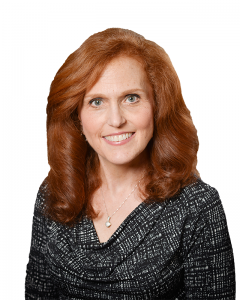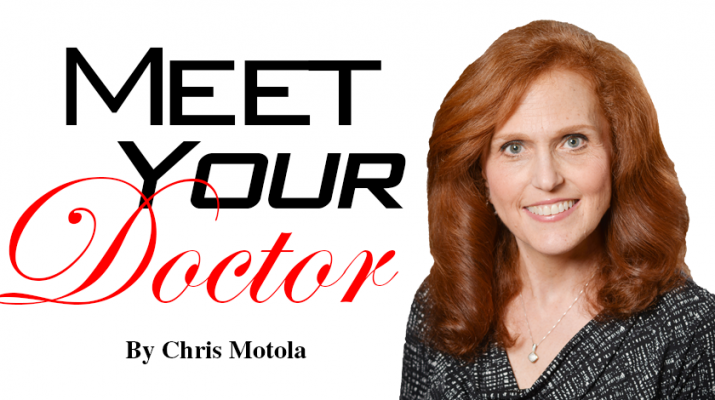Lead physician of Physician House Calls program at Jewish Senior Life loves spending time with patients — at their homes
By Chris Motola
 Q: One of the more unusual aspects of your practice is that you do house calls.
Q: One of the more unusual aspects of your practice is that you do house calls.
A: We at The Physician House Calls program see patients on campus at our assisted living and independent living facilities, but we also have an outreach center to see patients in their homes and some assisted living centers in the community. We have a team of myself, a nurse practitioner, two RNs that job-share and we also access a clinical nurse psychologist and a social worker. So it’s a team approach. We visit home outpatients one-on-one to address their needs medically, socially and psychologically. It’s just a very exciting program to be a part of.
Q: Walk me through what one of your house calls might look like.
A: Basically we get their information from their previous physician and I review their records before even sitting down with them. Then I have a one-on-one face-to-face interaction with them where I go over their medical history and medications. It helps me to see any barriers they might have to care. It helps me see what their goals are and really coordinate their care. And coming from that, I look at test they might need and basic routine medical care they haven’t had access to because they haven’t been able to get to a doctor. So many of our home-bound adults are only using medical care in times of crisis when they go to emergency rooms. This kind of care prevents them from having to do that. Then we have a follow-up with my nurse practitioner to answer questions and talk about lab results. I also help them navigate medical advance directives for end of life. That can take a lot of time, so I help them fill out forms and answer their questions.
Q: What are some of the advantages of going to the patient?
A: I get to understand what medications they’re actually taking and how they’re taking it. In an office setting, you don’t necessarily get to see that. I can also pick up on cognitive problems a lot more easily in seeing how they interact with their environment than I can in an office. I can also identify barriers to care, how much mobility they really have. I also get so much gratification from it. I get to learn more about my patients and their families. And families get to know me and trust me. When you have that personal connection, people trust you and they’re more likely to take your recommendations seriously.
Q: Is this covered by insurance?
A: Yes. While it feels like a concierge service, it doesn’t cost our home-bound patients anything extra. I spend face-to-face an hour to two hours with patients. And follow-up visits might be a half-hour to two hours. I’m there to do what I need to do without time limitations.
Q: What does this mean in terms of time management for you? You’re spending longer with patients, and you’re commuting to them on top of that.
A: There’s a two-fold piece to that. Number one, Jewish Senior Life really believes in the program. So they support me having extra time with patients. The other part is that I am a physician who believes it’s OK to do my paperwork at home on my personal time. Every one of my team members believes in the same philosophy. It’s not a money-making practice. You hope for that to be the case, but the focus is on spending the time with patients. Our program is so successful that our census is going up. It’s an extremely positive and growing one. We’re having a part-time physician joining me soon. All our patients have to be over 65 and have difficulty getting to the office, but we work to keep patients in their homes and keep them independent. Us going to them rather than having to have their family drive them around also helps them feel more independent. Some don’t even have family members to bring them.
Q: Do you find the outcomes are better?
A: Absolutely. They did a study at the University of Rochester that looked at it and our program reduced hospitalizations and E.D. [emergency department] visits by half. And the reasons are multifactorial. We have good follow-up, so we’re there frequently enough to notice coughs and edemas in their legs, so we can intervene before they’re in a time of crisis. So I think that’s the first piece that’s causing us to have better outcomes. But I think it’s also providing excellent medical care in a team approach, and help families support their loved ones as well.
Lifelines
Name: Brenda Baratta, M.D.
Position: Lead physician of Physician House Calls program at Jewish Senior Life
Hometown: Auburn, NY
Education: University of Rochester Medical Center
Career: Primary care internal medicine physician at Park Ridge Hospital (1992-1995) and Lifetime Health (1995-2015). Physician reviewer, Maximus Federal Services (2014-2015); physician leader, Physicians House Calls, Jewish Senior Life (2015-present)
Affiliations: Highland Hospital, Strong Memorial, Rochester General, Unity
Organizations: Monroe County Medical Society; American Board of Internal Medicine
Family: Husband, two daughters
Hobbies: Piano, classical music, tap dancing, singing in church choir

